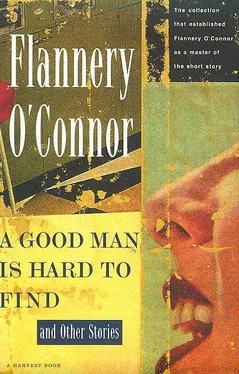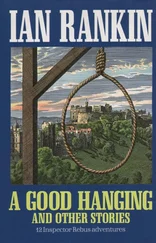She sat motionless at the desk for ten or fifteen minutes and then as if she had gained some strength, she got up and got in her car and drove to the cornfield.
The road ran through a shadowy pine thicket and ended on top of a hill that rolled fan-wise down and up again in a broad expanse of tasseled green. Mr. Guizac was cutting from the outside of the field in a circular path to the center where the graveyard was all but hidden by the corn, and she could see him on the high far side of the slope, mounted on the tractor with the cutter and wagon behind him. From time to time, he had to get off the tractor and climb in the wagon to spread the silage because the Negro had not arrived. She watched impatiently, standing in front of her black coupe with her arms folded under her smock, while he progressed slowly around the rim of the field, gradually getting close enough for her to wave to him to get down. He stopped the machine and jumped off and came running forward, wiping his red jaw with a piece of grease rag.
“I want to talk to you,” she said and beckoned him to the edge of the thicket where it was shady. He took off the cap and followed her, smiling, but his smile faded when she turned and faced him. Her eyebrows, thin and fierce as a spider’s leg, had drawn together ominously and the deep vertical pit had plunged down from under the red bangs into the bridge of her nose. She removed the bent picture from her pocket and handed it to him silently. Then she stepped back and said, “Mr. Guizac! You would bring this poor innocent child over here and try to marry her to a half-witted thieving black stinking niggerl What kind of a monster are you!”
He took the photograph with a slowly returning smile. “My cousin,” he said. “She twelve here. First Communion. Six-ten now.”
Monster! she said to herself and looked at him as if she were seeing him for the first time. His forehead and skull were white where they had been protected by his cap but the rest of his face was red and bristled with short yellow hairs. His eyes were like two bright nails behind his gold-rimmed spectacles that had been mended over the nose with haywire. His whole face looked as if it might have been patched together out of several others. “Mr. Guizac,” she said, beginning slowly and then speaking faster until she ended breathless in the middle of a word, “that nigger cannot have a white wife from Europe. You can’t talk to a nigger that way. You’ll excite him and besides it can’t be done. Maybe it can be done in Poland but it can’t be done here and you’ll have to stop. It’s all foolishness. That nigger don’t have a grain of sense and you’ll excite…”
“She in camp three year,” he said.
“Your cousin,” she said in a positive voice, “cannot come over here and marry one of my Negroes.”
“She six-ten year,” he said. “From Poland. Mamma die, pappa die. She wait in camp. Three camp.” He pulled a wallet from his pocket and fingered through it and took out another picture of the same girl, a few years older, dressed in something dark and shapeless. She was standing against a wall with a short woman who apparently had no teeth. “She mamma,” he said, pointing to the woman. “She die in two camp.”
“Mr. Guizac,” Mrs. McIntyre said, pushing the picture back at him, “I will not have my niggers upset. I cannot run this place without my niggers. I can run it without you but not without them and if you mention this girl to Sulk again, you won’t have a job with me. Do you understand?”
His face showed no comprehension. He seemed to be piecing all these words together in his mind to make a thought.
Mrs. McIntyre remembered Mrs. Shortley’s words: “He understands everything, he only pretends he don’t so as to do exactly as he pleases,” and her face regained the look of shocked wrath she had begun with. “I cannot understand how a man who calls himself a Christian,” she said, “could bring a poor innocent girl over here and marry her to something like that. I cannot understand it. I cannot!” and she shook her head and looked into the distance with a pained blue gaze.
After a second he shrugged and let his arms drop as if he were tired. “She no care black,” he said. “She in camp three year.”
Mrs. McIntyre felt a peculiar weakness behind her knees. “Mr. Guizac,” she said, “I don’t want to have, to speak to you about this again. If I do, you’ll have to find another place yourself, Do you understand?”
The patched face did not say. She had the impression that he didn’t see her there. “This is my place,” she said. “I say who will come here and who won’t.”
“Ya,” he said and put back on his cap.
“I am not responsible for the world’s misery,” she said as an afterthought.
“Ya,” he said.
“You have a good job. You should be grateful to be here,” she added, “but I’m not sure you are.”
“Ya,” he said and gave his little shrug and turned back to the tractor.
She watched him get on and maneuver the machine into the corn again. When he had passed her and rounded the turn, she climbed to the top of the slope and stood with her arms folded and looked out grimly over the field. “They’re all the same,” she muttered, “whether they come from Poland or Tennessee. I’ve handled Herrins and Ringfields and Shortleys and I can handle a Guizac,” and she narrowed her gaze until it closed entirely around the diminishing figure on the tractor as if she were watching him through a gunsight. All her life she had been fighting the world’s overflow and now she had it in the form of a Pole. “You’re just like all the rest of them,” she said, “—only smart and thrifty and energetic but so am I. And this is my place,” and she stood there, a small black-hatted, black-smocked figure with an aging cherubic face, and folded her arms as if she were equal to anything. But her heart was beating as if some interior violence had already been done to her. She opened her eyes to include the whole field so that the figure on the tractor was no larger than a grasshopper in her widened view.
She stood there for some time. There was a slight breeze and the corn trembled in great waves on both sides of the slope. The big cutter, with its monotonous roar, continued to shoot it pulverized into the wagon in a steady spurt of fodder. By nightfall, the Displaced Person would have worked his way around and around until there would be nothing on either side of the two hills but the stubble, and down in the center, risen like a little island, the graveyard where the Judge lay grinning under his desecrated monument.
The priest, with his long bland face supported on one finger, had been talking for ten minutes about Purgatory while Mrs. McIntyre squinted furiously at him from an opposite chair. They were drinking ginger ale on her front porch and she had kept rattling the ice in her glass, rattling her beads, rattling her bracelet like an impatient pony jingling its harness. There is no moral obligation to keep him, she was saying under her breath, there is absolutely no moral obligation. Suddenly she lurched up and her voice fell across his brogue like a drill into a mechanical saw. “Listen!” she said, “I’m not theological. I’m practical! I want to talk to you about something practical!”
“Arrrrrrr,” he groaned, grating to a halt.
She had put at least a finger of whisky in her own ginger ale so that she would be able to endure his full-length visit and she sat down awkwardly, finding the chair closer to her than she had expected. “Mr. Guizac is not satisfactory,” she said.
The old man raised his eyebrows in mock wonder.
“He’s extra,” she said. “He doesn’t fit in. I have to have somebody who fits in.”
Читать дальше









